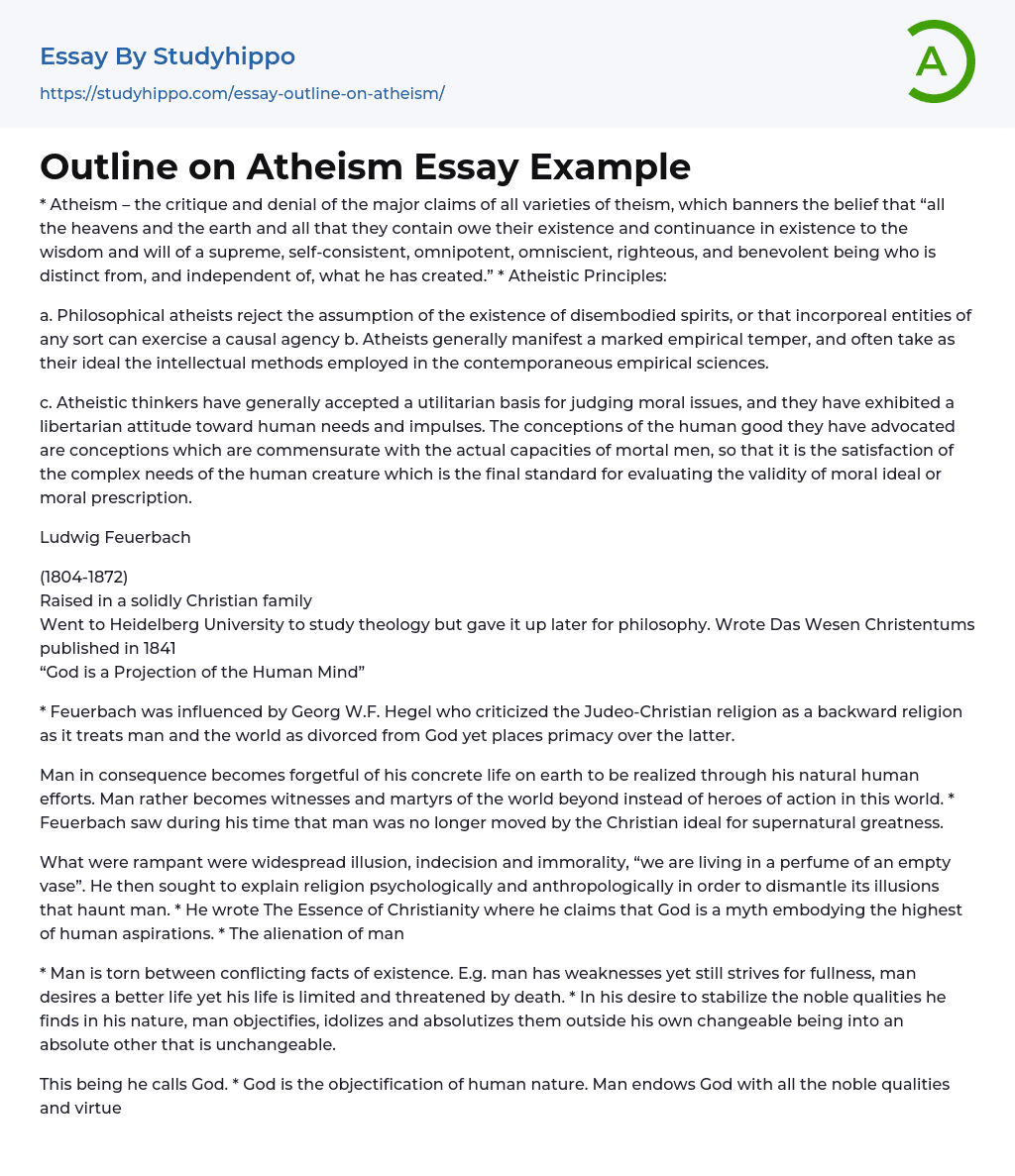Atheism involves the denial of the main assertions made by any form of theism, questioning the existence of a supreme being who is accountable for creating and maintaining everything in both the heavens and on earth.
Atheistic Principles:
- Philosophical atheists reject the assumption of the existence of disembodied spirits, or that incorporeal entities of any sort can exercise a causal agency b. Atheists generally manifest a marked empirical temper, and often take as their ideal the intellectual methods employed in the contemporaneous empirical sciences.
-
Atheistic thinkers have generally accepted a utilitarian basis for judging moral issues, and they have exhibited a libertarian attitude toward human needs and impulses. The conceptions of the human good they have advocated are conceptio
...
ns which are commensurate with the actual capacities of mortal men, so that it is the satisfaction of the complex needs of the human creature which is the final standard for evaluating the validity of moral ideal or moral prescription.
Despite being raised in a Christian family, Ludwig Feuerbach (1804-1872) chose philosophy over theology while studying at Heidelberg University. In 1841, he published Das Wesen Christentums, where he contended that "God is a Projection of the Human Mind". These ideas were influenced by Georg W.F. Hegel's criticism of the Judeo-Christian religion, which emphasized humans and the world as distinct from God and placed greater significance on God.
The Christian ideal has caused a shift in man's focus from his earthly life and the efforts required to attain it. Instead, man is now more intrigued by the world beyond and assumes the role
View entire sampleJoin StudyHippo to see entire essay
of an observer and sacrifice rather than actively engaging in this world. Feuerbach recognized this change during his era and observed that man was no longer driven by the Christian aspiration for supernatural greatness.
What was prevalent were widespread illusions, indecision, and immorality - "we are living in a perfume of an empty vase". The author subsequently aimed to psychologically and anthropologically explain religion, with the intention of dismantling the illusions that torment humankind. In his work, The Essence of Christianity, he asserts that God is a myth representing the loftiest human aspirations.
The human condition is characterized by a conflict between opposing elements. Despite having weaknesses, individuals strive for fulfillment and yearn for an improved life. However, their existence is finite and threatened by mortality. To anchor the admirable attributes they discover within themselves, people externalize and idolize them as an unchanging entity separate from their own being - this entity is commonly referred to as God. God symbolizes the epitome of human nature, embodying all noble qualities and virtues such as wisdom, will, and justice. Yet simultaneously, humans reject these qualities as part of themselves, leading to self-devaluation and a loss of their inherent essence. Paradoxically, it is through man's death that God finds manifestation.
Atheistic humanism
Feuerbach considered religion to be humanity's childlike state, while atheism represents maturity. Atheism is the recognition of mankind's own greatness and humanity, reclaiming one's faith from external sources. God is merely a reflection of man's own essence. The divine qualities attributed to God are actually qualities of mankind. Atheism is the rediscovery of humanity's essence and can be seen as humanism. Humanism acknowledges
the divine aspects of man upon realizing his inherent greatness and humanity. Ultimately, what is considered atheism today may become religion in the future.
The following text shall beand unified while retaining the and their contents:
- Spirituality essays
- Angel essays
- Afterlife essays
- Atheism essays
- Bible essays
- Buddhism essays
- Christian Worldview essays
- Christianity essays
- Confession essays
- Cosmological Argument essays
- Deism essays
- Devil essays
- Existence of God essays
- Faith essays
- Freedom Of Religion essays
- God essays
- Hinduism essays
- Immortality essays
- Islam essays
- Jainism essays
- Jews essays
- Judaism essays
- Miracle essays
- Monk essays
- Monotheism essays
- New Testament essays
- Old Testament essays
- Pilgrimage essays
- Puritans essays
- Revelation essays
- Ritual essays
- Salvation essays
- Sin essays
- Sinners essays
- Soul essays
- Taoism essays
- Temple essays
- Theology essays




